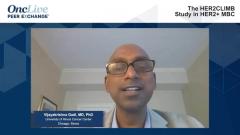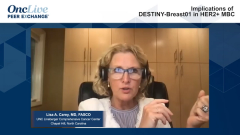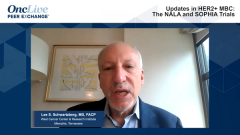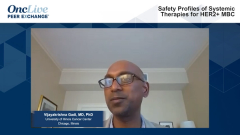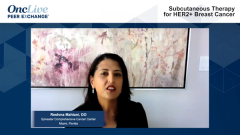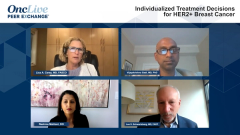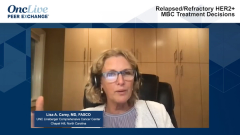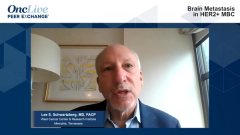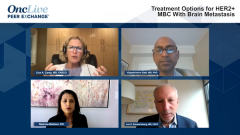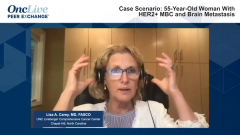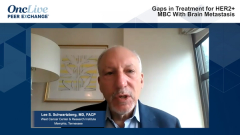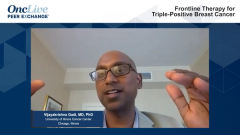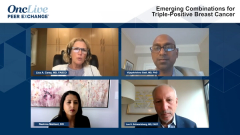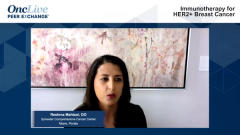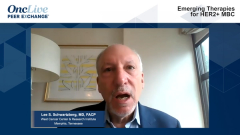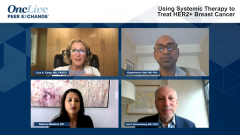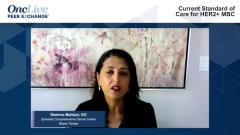
Implications of DESTINY-Breast01 in HER2+ MBC
Considerations for initiating trastuzumab deruxtecan in patients with HER2-positive metastatic breast cancer who received previous treatment with trastuzumab emtansine based on data demonstrated by the DESTINY-Breast01 study.
Episodes in this series

Lisa A. Carey, MD, FASCO: Another drug that’s wildly active and interesting is trastuzumab deruxtecan. Reshma, you were involved with the DESTINY-Breast01 trial. Can you comment on that?
Reshma Mahtani, DO: I’ll start by touching on a point that was made. In terms of the biology of the disease, it may be different as we utilize therapies earlier in the treatment setting. As we move forward and see patients relapse, the biology of the disease is going to be resistant and may not reflect well on the studies that we’ve discussed thus far. One of the active agents, which we’ve been fortunate to add to the armamentarium, is trastuzumab deruxtecan. The DESTINY-Breast01 trial looked at this agent. This was a phase 2 study of about 184 patients who had received T-DM1 [trastuzumab emtansine] prior and had progressed or were intolerant. A large majority of patients had progressed. We saw remarkable activity in this heavily pretreated patient population. The overall response rate was almost 61%, and we saw some updated data recently that showed a median progression-free survival of 19.4 months, and although not mature, overall survival of about 25 months. Looking at how this therapy has been quickly adopted, we see remarkable activity in this very heavily pretreated patient population.
To be clear, that’s survival after they enter the trial.
Lisa A. Carey, MD, FASCO: So you’re far down the road at that point.
Reshma Mahtani, DO: Yeah. As we look at how far we’ve come in the treatment of HER2-positive disease, seeing patients survive this far out, after receiving prior therapies—the median was 6—it’s impressive to see these results. Of course, there are some concerns regarding toxicity. We’re going to touch on that later, in more detail, with regard to ILD [interstitial lung disease] and pneumonitis with this agent.
Lisa A. Carey, MD, FASCO: As we talk about things moving into the early setting, some toxicities you might be more accepting of in a heavily pretreated patient with fewer options, particularly when you get into curative intent, start to be a concern. You raised a really important point that I’d like to expand on, which is the nature of the disease that we’re treating. The nature of the disease, in the metastatic setting, may change dramatically as patients with recurrent disease have received 3, 4, 5 agents prior to recurrence. But that also means that an increasing proportion of the metastatic population is the de novo group, who are completely naïve. As we design trials, we may have to be explicit about stratifying those 2 groups because they used to be a little different—having been exposed to 1 anti-HER2 drug vs not. It’s going to be a different kettle of fish. Anybody have any comments about that?
Lee S. Schwartzberg, MD, FACP: That’s an important observation, and we’re going to have to design trials for these 2 populations. I also think we may be seeing heterogeneity in the patients who have metastatic disease. We always rebiopsy these patients. But I’m interested in the molecular findings and whether patients who relapse are actually driven by the HER2 protein. We may have eradicated HER2+ cells, and there may be cells that are either more luminal-like or more basal-like typically, and we may have to have a different approach. I like the idea that we’re moving into this realm by looking at activation of the HER2 pathway and cells that are driven by it vs not. We are further characterizing beyond just IHC [immunohistochemistry] tests and FISH [fluorescence in situ hybridization].
Reshma Mahtani, DO: Understanding mechanisms of resistance is going to be very important moving forward and understanding how patients develop resistance to these therapies. Looking forward, that will be an important point to clarify.
Transcript Edited for Clarity


